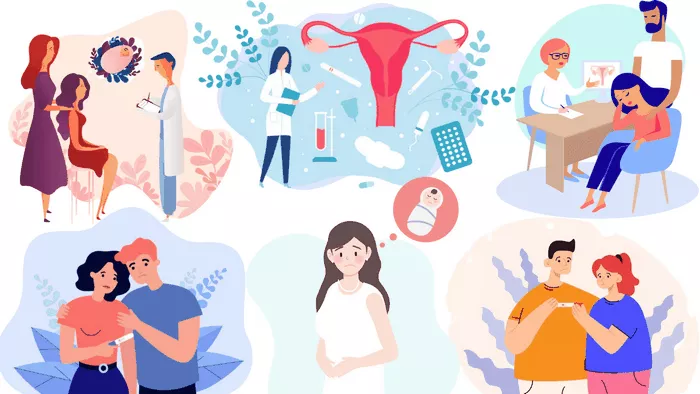Infertility, defined as the inability to conceive after one year of regular, unprotected intercourse, affects millions of individuals and couples worldwide. According to the World Health Organization (WHO), infertility is a prevalent issue, with approximately 8-12% of couples experiencing difficulties conceiving. The emotional toll of infertility can be profound, impacting mental health, relationships, and overall well-being.
Common Causes of Infertility
1. Ovulation Disorders
Ovulation disorders are among the leading causes of infertility in women. Irregular or absent ovulation can hinder the release of mature eggs necessary for fertilization. Polycystic Ovary Syndrome (PCOS) is a common ovulation disorder characterized by hormonal imbalances, ovarian cysts, and irregular menstrual cycles. Hormonal imbalances, such as elevated levels of testosterone or insulin resistance, can disrupt ovulation and impair fertility. Other ovulation disorders, such as hypothalamic dysfunction or premature ovarian failure, can also contribute to infertility by disrupting the normal ovulatory process.
2. Tubal Factors
The fallopian tubes play a crucial role in fertility by providing a pathway for sperm to reach the egg and transporting the fertilized egg to the uterus for implantation. Damage or blockages in the fallopian tubes can impede this process, preventing sperm from reaching the egg or obstructing the passage of the fertilized egg into the uterus. Common causes of tubal factor infertility include pelvic inflammatory disease (PID), endometriosis, previous pelvic surgery, or adhesions resulting from abdominal infections or surgeries. In some cases, tubal factor infertility may require surgical intervention to repair or unblock the fallopian tubes.
3. Endometriosis
Endometriosis is a chronic condition characterized by the presence of endometrial-like tissue outside the uterus, commonly found on the ovaries, fallopian tubes, or pelvic peritoneum. This abnormal tissue growth can cause inflammation, scarring, and adhesions, leading to pelvic pain and infertility. Endometriosis can impair fertility by interfering with ovulation, disrupting the function of the fallopian tubes, or altering the uterine environment, making it difficult for a fertilized egg to implant and develop properly. Treatment for endometriosis-related infertility may involve medication to alleviate symptoms, surgery to remove endometrial implants or adhesions, or assisted reproductive technologies (ART) such as in vitro fertilization (IVF).
Risk Factors
Several factors can increase the risk of infertility in both men and women. Advanced maternal age is a significant risk factor for female infertility, as ovarian reserve and egg quality decline with age. Male infertility can be influenced by factors such as age, lifestyle choices (e.g., smoking, excessive alcohol consumption, and drug use), exposure to environmental toxins, and certain medical conditions (e.g., diabetes, obesity, or sexually transmitted infections). Other risk factors for infertility include obesity, stress, poor nutrition, and genetic predisposition.
Diagnosis and Treatment Options
Diagnosing the underlying cause of infertility typically involves a comprehensive medical evaluation, including a thorough medical history, physical examination, and diagnostic tests such as blood tests, semen analysis, ultrasound, hysterosalpingography (HSG), or laparoscopy. Treatment options for infertility vary depending on the underlying cause and may include lifestyle modifications, medication to induce ovulation or improve sperm quality, surgical procedures to correct anatomical abnormalities or remove obstructions, or assisted reproductive technologies (ART) such as intrauterine insemination (IUI) or in vitro fertilization (IVF). Counseling and psychological support may also be beneficial for individuals and couples navigating the emotional challenges of infertility.
Prevention and Management
While some causes of infertility may be beyond our control, there are steps individuals and couples can take to optimize their fertility and reduce the risk of infertility. Maintaining a healthy lifestyle, including regular exercise, balanced nutrition, and maintaining a healthy weight, can positively impact fertility. Avoiding tobacco, excessive alcohol consumption, and illicit drugs can also improve fertility outcomes. Regular medical check-ups and early intervention for underlying health conditions can help identify and address potential fertility issues before they become significant concerns. Seeking support from fertility specialists, counselors, or support groups can provide valuable guidance and emotional support throughout the fertility journey.
Support and Resources
Navigating infertility can be challenging, both emotionally and physically, but support is available for individuals and couples facing fertility struggles. Support groups, online forums, and counseling services offer a safe space for sharing experiences, seeking advice, and accessing emotional support from others who understand the challenges of infertility. Additionally, fertility clinics and reproductive specialists provide comprehensive care and guidance tailored to individual needs, offering a range of treatment options and support services to help individuals achieve their family-building goals.
Conclusion
Infertility is a complex and multifaceted issue that can have profound implications for individuals and couples trying to conceive. By understanding the common causes of infertility, identifying risk factors, and seeking timely diagnosis and treatment, individuals can take proactive steps to optimize their fertility and improve their chances of conceiving. Through education, support, and access to resources, individuals and couples can navigate the challenges of infertility with resilience and hope, ultimately realizing their dreams of building a family.

























